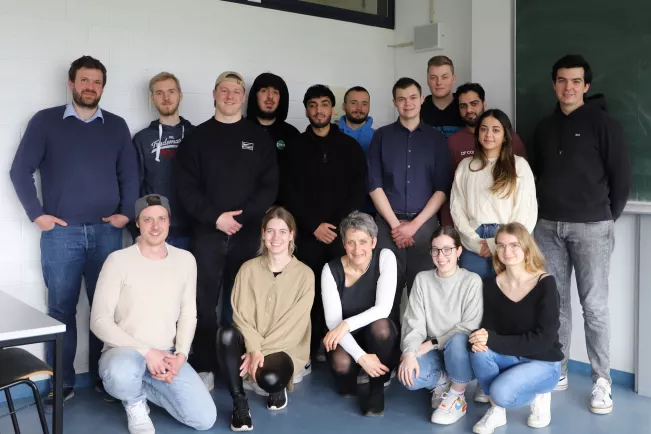Communications and Marketing
Students install ventilation systems in classrooms

The ventilator window ventilation system developed by the Max Planck Institute for Chemistry in Mainz (MPI C) has already been installed in over 2000 German classrooms. The twelve students from the Department of Electrical Engineering, Mechanical Engineering and Technical Journalism (EMT) will now make their own systems and install them in the classrooms. Afterwards, they will measure the effect of the system in terms of temperature, CO2 content, humidity, noise pollution and the well-being of the students.
For Professor Stefanie Meilinger, the significance of the project goes beyond the course: "With their work in the practical project, our students create real added value for society. This transfer of knowledge is an important task of science. Through the cooperation with the Max Planck Institute for Chemistry, we can make this offer to our students," says Meilinger.
The Max Planck Institute for Chemistry in Mainz developed the ventilation system during the Covid 19 pandemic. It is intended to be an inexpensive and effective alternative to air purification devices. The system captures the warm air that the students breathe and transports it outside with fans. At the same time, air is directed from the open window to the floor of the classroom with the help of a foil. Through this circulation, the air is continuously renewed and aerosols do not accumulate in the room air. As a result, the risk of infection decreases, as the scientists from the Max Planck Institute found out in their research. The H-BRS students will carry out their own measurements after the installation of the system. In addition to the technical side, they also want to investigate the effect of the system on the students' well-being.
The practical project is part of the research project Climate-Environment-Health (KLUGER) Transfer, in which the university is cooperating with the Max Planck Institute for Chemistry in Mainz. The partners want to use the example of global climate and environmental changes to help promote the transfer between science and society. To this end, suitable and innovative formats are to be analysed and implemented in order to create a sustainable system of transferring and imparting knowledge into practice.
Contact

Stefanie Meilinger
Professor for Sustainable Technologies, esp. Energy Efficiency and Renewable Energies, Director of the International Centre for Sustainable Development (IZNE), Department Engineering and Communication (IWK)
Research fields
Location
Sankt Augustin
Room
F 321
Address
Grantham-Allee 20
53757 Sankt Augustin
Telephone
+49 2241 865 718
Pascal Schröder
Project management for the further development of the university website
Location
Sankt Augustin
Room
E 241
Address
Grantham-Allee 20
53757, Sankt Augustin
Telephone
+49 2241 865 9969